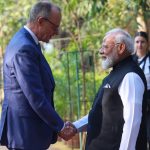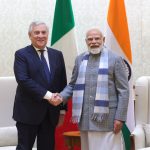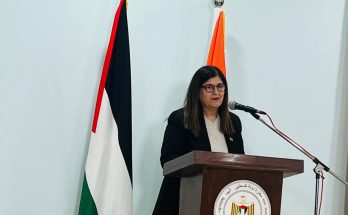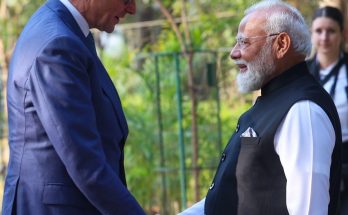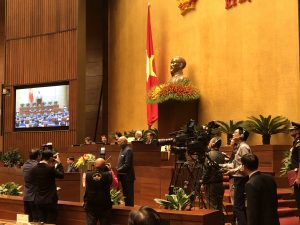
HANOI: Amid rising security threats and shifting geopolitical alignments in the region triggered by China’s assertiveness, India and Vietnam have agreed to launch a bilateral maritime dialogue and intensify collaboration in shaping a peaceful Indo-Pacific, underpinned by a rules-based order.
With around 500 Vietnamese legislators listening in, India’s President Ram Nath Kovind announced the decision to initiate maritime dialogue in his address to the National Assembly of Vietnam on November 20. He is the third world leader to address Vietnam’s parliament, a unique honour that underlined the growing importance of New Delhi in Hanoi’s foreign policy calculus.
The first maritime dialogue will be held in early 2019. “India looks forward to enhanced bilateral cooperation in the maritime domain – for instance, through our first Bilateral Maritime Security Dialogue to be hosted by Vietnam in early 2019. Maritime security, piracy, and drug trafficking using the oceans are issues of common concern,” said President Kovind. “I am confident that the programme of regular and friendly visits to each other’s ports by naval and coast guard ships from our countries will upgrade cooperation.”
Placing India-Vietnam maritime dialogue in the historical context, Mr Kovind said: “We are both ancient maritime nations and are stake-holders in the commerce, security and stability of the Indo-Pacific Region. Above all, we share the same values.”
“Our founding fathers taught us to dream the same dreams – dreams for ourselves, dreams for each other, dreams for post-colonial nations everywhere, and dreams for the future and for our children.”
President Kovind underlined a shared vision for the Indo-Pacific Region, “of which the South China Sea is a critical component.” “We share a vision of a rules-based order that respects sovereignty and territorial integrity, ensures freedom of navigation and over-flight, as well as un-impeded commerce,” he said.
“Our shared vision seeks peaceful resolution of disputes, with full respect for legal and diplomatic processes in accordance with principles of international law, including those reflected in the United Nations Convention on the Law of the Sea.”
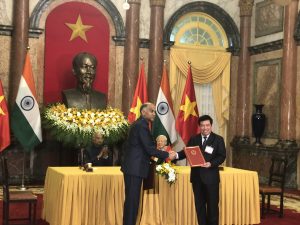
Issues regarding maritime security cooperation and the evolving regional architecture also figured in wide-ranging discussions between President Kovind and his Vietnamese host, Nguyen Phu Trong, General Secretary of the Communist Party of Vietnam and the President of Vietnam.
“We decided to deepen strategic partnership in all areas. Defence and security are important aspects of the India-Vietnam partnership,” said Mr Trong.
“Vietnam appreciates India’s Act East policy and India’s support for ASEAN’s centrality in the evolving regional architecture. We have agreed to develop a peaceful and prosperous Indo-Asia-Pacific,” he said.
The talks in Hanoi has pushed the envelope for comprehensive strategic partnership and galvanised India-Vietnam relations across the spectrum. The two sides signed three pacts in in the fields of communications, education and trade and investment. Looking ahead, the two leaders reiterated their joint commitment to achieve bilateral trade target of $15 billion by 2020 and spoke in unison about expanding people-to-people and cultural contacts.
Author Profile

- Manish Chand is Founder and Editor-in-Chief of India Writes Network (www.indiawrites.org) and India and World, a pioneering magazine focused on international affairs. He is CEO, Centre for Global India Insights, an India-based think tank focused on global affairs.
Latest entries
 India and the WorldFebruary 2, 2026Trump announces trade deal with India, Modi ‘delighted’
India and the WorldFebruary 2, 2026Trump announces trade deal with India, Modi ‘delighted’ India and the WorldJanuary 31, 2026Palestinian minister bats for mediatory role for India in ending Gaza conflict
India and the WorldJanuary 31, 2026Palestinian minister bats for mediatory role for India in ending Gaza conflict India and the WorldJanuary 13, 2026India, Germany raise the bar for defence, economic ties
India and the WorldJanuary 13, 2026India, Germany raise the bar for defence, economic ties India and the WorldDecember 12, 2025India-Italy bonding: Tajani’s visit raises the bar for business, maritime ties
India and the WorldDecember 12, 2025India-Italy bonding: Tajani’s visit raises the bar for business, maritime ties



